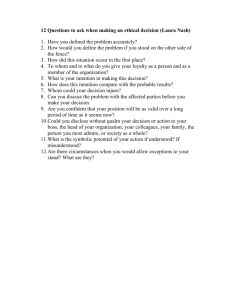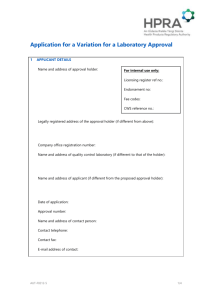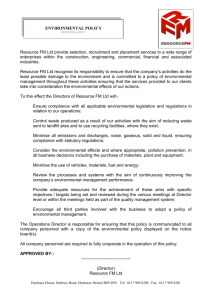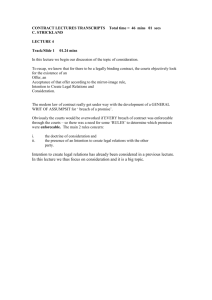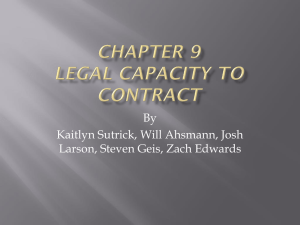Articles English Law – A Love Letter
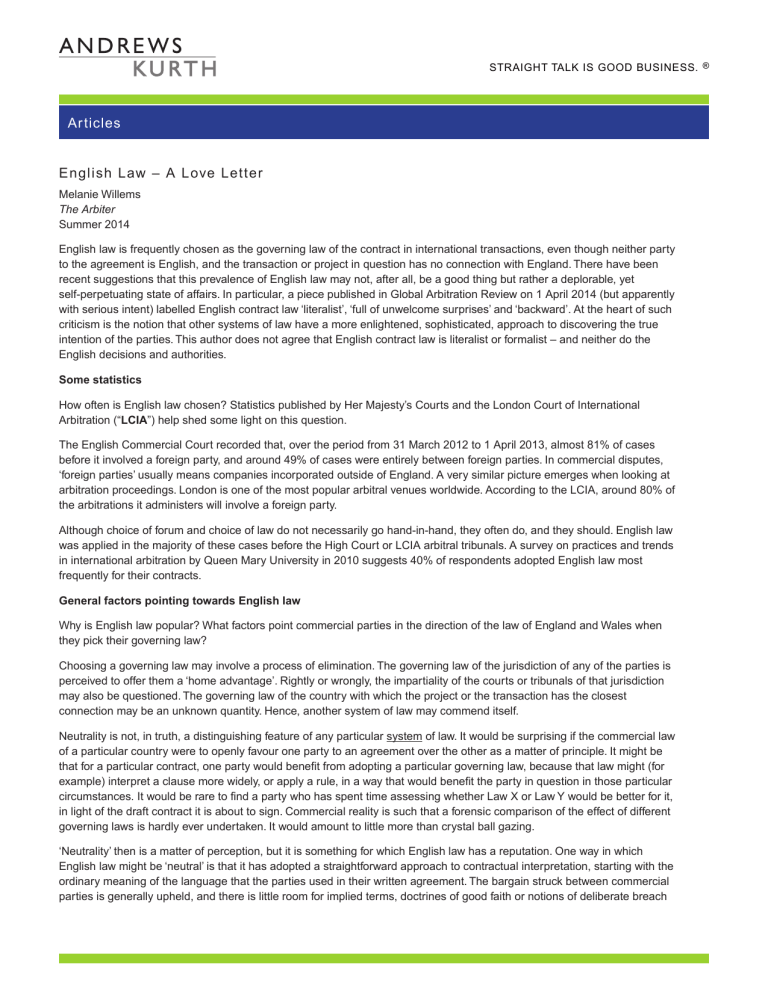
STRAIGHT TALK IS GOOD BUSINESS.
®
Ar ticles
English Law – A Love Letter
Melanie Willems
The Arbiter
Summer 2014
English law is frequently chosen as the governing law of the contract in international transactions, even though neither party to the agreement is English, and the transaction or project in question has no connection with England. There have been recent suggestions that this prevalence of English law may not, after all, be a good thing but rather a deplorable, yet self-perpetuating state of affairs. In particular, a piece published in Global Arbitration Review on 1 April 2014 (but apparently with serious intent) labelled English contract law ‘literalist’, ‘full of unwelcome surprises’ and ‘backward’. At the heart of such criticism is the notion that other systems of law have a more enlightened, sophisticated, approach to discovering the true intention of the parties. This author does not agree that English contract law is literalist or formalist – and neither do the
English decisions and authorities.
Some statistics
How often is English law chosen? Statistics published by Her Majesty’s Courts and the London Court of International
Arbitration (“LCIA”) help shed some light on this question.
The English Commercial Court recorded that, over the period from 31 March 2012 to 1 April 2013, almost 81% of cases before it involved a foreign party, and around 49% of cases were entirely between foreign parties. In commercial disputes,
‘foreign parties’ usually means companies incorporated outside of England. A very similar picture emerges when looking at arbitration proceedings. London is one of the most popular arbitral venues worldwide. According to the LCIA, around 80% of the arbitrations it administers will involve a foreign party.
Although choice of forum and choice of law do not necessarily go hand-in-hand, they often do, and they should. English law was applied in the majority of these cases before the High Court or LCIA arbitral tribunals. A survey on practices and trends in international arbitration by Queen Mary University in 2010 suggests 40% of respondents adopted English law most frequently for their contracts.
General factors pointing towards English law
Why is English law popular? What factors point commercial parties in the direction of the law of England and Wales when they pick their governing law?
Choosing a governing law may involve a process of elimination. The governing law of the jurisdiction of any of the parties is perceived to offer them a ‘home advantage’. Rightly or wrongly, the impartiality of the courts or tribunals of that jurisdiction may also be questioned. The governing law of the country with which the project or the transaction has the closest connection may be an unknown quantity. Hence, another system of law may commend itself.
Neutrality is not, in truth, a distinguishing feature of any particular system of law. It would be surprising if the commercial law of a particular country were to openly favour one party to an agreement over the other as a matter of principle. It might be that for a particular contract, one party would benefit from adopting a particular governing law, because that law might (for example) interpret a clause more widely, or apply a rule, in a way that would benefit the party in question in those particular circumstances. It would be rare to find a party who has spent time assessing whether Law X or Law Y would be better for it, in light of the draft contract it is about to sign. Commercial reality is such that a forensic comparison of the effect of different governing laws is hardly ever undertaken. It would amount to little more than crystal ball gazing.
‘Neutrality’ then is a matter of perception, but it is something for which English law has a reputation. One way in which
English law might be ‘neutral’ is that it has adopted a straightforward approach to contractual interpretation, starting with the ordinary meaning of the language that the parties used in their written agreement. The bargain struck between commercial parties is generally upheld, and there is little room for implied terms, doctrines of good faith or notions of deliberate breach
STRAIGHT TALK IS GOOD BUSINESS.
®
Ar ticles or fault-based remedies tilting the balance unexpectedly in favour of one or the other party. With English law, what you see is very often what you get.
English courts and tribunals have a (deserved) reputation for impartiality. While litigating or arbitrating in London is not cheap, justice will usually be done, and it will be seen to be done. One way of testing this proposition is considering the following question: do courts regularly find in favour of parties against the government? In England, they do.
Flexibility is another factor. English law, as a common law system, is based on judicial precedent and case law, as well as statute. The English law of contract is very much based on precedent: it is judge-made law. Over the centuries, English law has grown and kept pace with modern business practices and technology. It is therefore able to deal with complicated financial structures and technically complex issues, as in the energy, engineering and construction industries (sectors where
English law is often chosen). The prevalence of English law has worked to its advantage. Because more complex contracts are subject to English law, English judges and arbitrators get to resolve more such disputes, and jurisprudence can develop.
While decisions on contractual interpretations are limited to the agreement in question, it nonetheless helps to have recourse to a body of law on recurring issues and commentary on the standard forms that often provide the foundation for the parties’ contracts.
Language is also a factor. English is the lingua franca of international commerce and the global financial markets, and that is reflected in contracts. England is a politically stable jurisdiction. London is one of the world’s financial centres, and it offers a strong legal infrastructure, with many experienced commercial and dispute resolution lawyers practising English law.
With these general points in mind, we turn to the principles of contractual interpretation under English law – but, first, a brief comparative study.
Contractual interpretation under civil law
Rather than just extolling the virtues of English law, it is instructive to consider the alternatives. The great divide is between
English law as a common law system, and civil law (for example, the laws of France, Germany, Italy and Switzerland).
Common law jurisdictions interpret a contract objectively, staying close to the words of the agreement, and will not apply notions of reasonableness or materiality. Civil law, on the other hand, is more subjective and sets out to establish the actual intentions of the parties by looking at all aspects of the transactions and their relationship.
By way of an example, the German Bundesgesetzbuch (“BGB”) considers that a binding contract comes into existence by virtue of the parties’ expressing their will or common intention. The starting point under German law, as in other civil law systems, is that the parties have freedom to contract. They exercise that freedom through their declaration of will, which is a holistic concept. Article 133 of the BGB states that, when interpreting or construing the parties’ declaration of will, their real will or intention has to be ‘explored’ (“erforschen”), ‘rather than adhering to the literal meaning of the declaration’. That exploration often goes beyond the four corners of the written agreement.
Civil law has also embraced the doctrine of good faith. Article 157 of the BGB provides further that contracts are to be interpreted as required by ‘good faith’ (“treu und glauben”), taking customary practice into consideration. Construction of contracts under German law also extends to what is called “dispositives Recht”. These are statutory provisions that apply for common forms of contract unless there is a contrary indication in the contract. So the judge looks first for statutory gap-fillers (which you may not know anything about if you were drafting the contract subject to German law), and if there are none, then according to the German Courts, he should determine what the parties would have stated in the contract (had they turned their minds to it), paying due regard to the requirements of good faith and commercial practice (BGHZ 16, 71).
Similarly, Article 1156 of the French Civil Code requires ‘… a search for the common intention of the contracting parties, rather than stopping at the literal meaning of their words.’ As explained by Lord Hoffmann in Chartbrook Ltd v Persimmon
Homes Ltd & Ors [2009] UKHL 38, under French law, the intention of the parties is considered to be a question of subjective fact, “uninfluenced by any rules of law”. His Lordship went on to describe differences between French and English law of contractual interpretation as follows:
STRAIGHT TALK IS GOOD BUSINESS.
®
Ar ticles
“It follows that any evidence of what [the parties] said or did, whether to each other or to third parties, may be relevant to establishing what their intentions actually were. There is in French law a sharp distinction between the ascertainment of their intentions and the application of legal rules which may, in the interests of fairness to other parties or otherwise, limit the extent to which those intentions are given effect. English law, on the other hand, mixes up the ascertainment of intention with the rules of law by depersonalising the contracting parties and asking, not what their intentions actually were, but what
a reasonable outside observer would have taken them to be.”
French law also applies an incarnation of the principle of good faith. Article 1135 of the French Civil Code states that
‘agreements are binding not only as to what is expressed therein, but also as to all the consequences which equity, usage or statute give to the obligation according to its nature.’ One may therefore draw the conclusion that under French law, the parties will be bound by reference to what they subjectively intended, but in addition, the law may impose further obligations on them by reference to what is fair or customary.
The English law approach to construing written contracts
Against that background, we turn to the key principles of the English law of contractual interpretation, to see whether they are really as anachronistic and rigid as has been suggested.
The late Lord Bingham succinctly summarised how English law sets out to determine the intention of the parties, objectively, in BCCI v Ali [2001] 1 AC 251:
“To ascertain the intention of the parties the court reads the terms of the contract as a whole, giving the words their natural and ordinary meaning in the context of the agreement, the parties’ relationship and all the relevant facts surrounding the transaction so far as known to the parties. To ascertain the parties’ intentions the court does not of course inquire into the
parties’ subjective states of mind but makes an objective judgment on the materials already identified.”
Other than the subjective beliefs of the parties, and evidence of the negotiations leading to the contract, the background to the contract against which the wording is construed (objectively) can include ‘absolutely anything’ that might affect how the language would have been understood by the reasonable person (Investors Compensation Scheme v West Bromwich
Building Society [1997] UKHL 28).
It bears emphasising that English law is fundamentally commercial, having absorbed the principles of the lex mercatoria (the law of merchants). To quote another famous passage of English law that appeared in The Antaios [1985] AC 191:
“… if detailed semantic and syntactical analysis of words in a commercial contract is going to lead to a conclusion that flouts
business commonsense, it must be made to yield to business commonsense …”
The English Courts have long accepted that any judge or arbitrator construing the contract should know, and bear in mind, the commercial purpose of the agreement.
1 More recently, in Rainy Sky SA v Kookmin Bank [2011] UKSC 50, the Supreme
Court confirmed that wherever there might be an alternative construction (so where the wording could have more than one meaning or effect), the court has to consider which one “is the more commercially sensible”, and should adopt that interpretation. Lord Clarke made it clear that it was not necessary for one possible meaning to go against business common sense, be extreme, absurd, irrational or even be commercially unreasonable. English law always sets out to find the most commercially reasonable interpretation among the various candidates. He concluded:
“… where a term of a contract is open to more than one interpretation, it is generally appropriate to adopt the interpretation
which is most consistent with business common sense.”
In Rainy Sky, Lord Clarke also made express reference to notions of fairness. He approved of statements to the effect that there is “a working assumption” that a fair construction best reflects what reasonable people would have expected. It must be recalled, however, that there is no overriding principle of fairness or reasonableness in English contract law. If the words are clear and can have one meaning only, they will be upheld in the commercial context. Lord Clarke did acknowledge the
STRAIGHT TALK IS GOOD BUSINESS.
®
Ar ticles traditional principle that where the parties have used unambiguous language, it will be applied.
It may be that this deference to the contractual wording – if it is clear – that leads critics to describe the English law approach as literalist. But English law has never been quick to accept that the parties would come to an agreement that strikes an impartial observer as unreasonable. Forty years ago, the House of Lords in L Schuler AG v Wickman Machine
Tool Sales Ltd [1974] AC 235 noted that:
“The fact that a particular construction leads to a very unreasonable result must be a relevant consideration. The more unreasonable the result the more unlikely it is that the parties can have intended it, and if they do intend it the more
necessary it is that they shall make that intention abundantly clear.”
There is a built-in protection against English law being too quick to uphold the contractual wording, which, when read literally, would seem unreasonable or be commercial nonsense. English law will tread carefully before giving effect to an unreasonable, unfair or uncommercial construction. Interpreting a contract is an iterative process. English law will take all the possible meanings that a contract might have, and investigate the commercial consequences, before adopting whichever one makes the most business common sense.
The ability of English law to correct mistakes by construction
Those who brand English law of contract interpretation as ‘unfailingly literalist’ would appear to be unfamiliar with the long-established doctrine of correcting mistakes, or amending the contractual wording, by construction. Yes, you read right: under English law, it is perfectly possible to read words into the contract that are not there, or take out words that are there, when interpreting the agreement.
It is of course the antithesis of a strict literal approach to construction to accept that if the contractual wording does not reflect the intention of the parties (as objectively determined by the reasonable man), it can be changed. In ICS v West
Bromwich, Lord Hoffmann explained that English law, when interpreting contracts, accepts that people sometimes make mistakes, that they may use the wrong words or that they might express themselves badly. Hence:
“... if one would nevertheless conclude from the background that something must have gone wrong with the language, the
law does not require judges to attribute to the parties an intention which they plainly could not have had.”
In Chartbrook v Persimmon, His Lordship returned to this topic, explaining that there was no limit to how much red ink was needed to change the contractual wording to correct a mistake by construction:
“… When the language used in an instrument gives rise to difficulties of construction, the process of interpretation does not require one to formulate some alternative form of words which approximates as closely as possible to that of the parties. …
The fact that the court might have to express that meaning in language quite different from that used by the parties … is no reason for not giving effect to what they appear to have meant. What is clear from these cases is that there is not, so to speak, a limit to the amount of red ink or verbal rearrangement or correction which the court is allowed. All that is required is that it should be clear that something has gone wrong with the language and that it should be clear what a reasonable
person would have understood the parties to have meant.”
This rule applies to mistakes in drafting. To give some examples:
A contract that, on its face, referred to amounts “actually paid” was corrected to refer to amounts “actually payable”: the result was that an insurer who was reinsured could claim monies due to him under the reinsurance policy from the reinsurer, even though the insurer had not yet paid his insured (Charter Reinsurance Co Ltd v Fagan [1997] AC 313).
Contractual wording may be re-arranged, or transposed and grammatical mistakes may be overlooked. In ICS v West
Bromwich, the House of Lords removed wording from within brackets, changing the effect of the relevant clause.
STRAIGHT TALK IS GOOD BUSINESS.
®
Ar ticles
Other cases show that obvious errors, such as the wrong name for a party, missing out a currency for payments, or using a standard form meant to apply to cargo insurance for a vessel insurance, will not trouble English law unduly: these mistakes were all corrected. The correct terms were read into the document, and clauses that had nothing to do with the actual subject matter of the contract were disregarded.
Where the contract is badly drafted, perhaps where the parties are not native English speakers, then English law will be keen to look for a sensible (rather than a strict) reading, and may more readily find mistakes that can be corrected by construction. As Lord Bridge put it in Mitsui Construction Co Ltd v AG of Hong Kong (1986) BLR 1, 14 in the context of a construction contract:
“But the poorer the quality of the drafting, the less willing any court should be to be driven by semantic niceties to attribute to the parties an improbable and unbusinesslike intention, if the language used, whatever it may lack in precision, is reasonably capable of an interpretation which attributes to the parties an intention to make provision for contingencies
inherent in the work contracted for on a sensible and businesslike basis.”
So has English law thrown the contract wording overboard?
Make no mistake, the rules that allow judges and arbitrators to correct the contractual wording by construction are not used as a licence to rewrite the entire agreement. English law readily accepts that the legal effect of a contract, when all interpretation and construction is done, might not reflect what the parties writing the document themselves actually intended. Lord Hoffmann made this plain in Attorney-General of Belize v Belize Telecom Ltd [2009] UKPC 10, when discussing how and when terms can be implied into the contract:
“The court has no power to improve upon the instrument which it is called upon to construe, whether it be a contract, a statute or articles of association. It cannot introduce terms to make it fairer or more reasonable. It is concerned only to discover what the instrument means. However, that meaning is not necessarily or always what the authors or parties to the document would have intended. It is the meaning which the instrument would convey to a reasonable person having all the
background knowledge which would reasonably be available …”
Instead of the contract being just a part of the evidence of the declaration of will of the parties (as it is under civil law), under
English law the contract takes on a life of its own, divorced from and independent of the parties and their subjective intention. For that reason, English law does not admit evidence of the prior negotiations between the parties, because whatever they may have said during negotiations, it is the final contract that matters. But the contract under English law is no
Frankenstein’s monster, turning on its creators, despite what (ill-informed?) critics may suggest.
There seems nothing objectionable in the notion that if you sign a contract that is plainly intended to be legally binding, you should be held to what the document means to any sensible reader. Commercial parties tend to be legally represented, and
English counsel can assist with any contract drafting. English law throws the onus of making sure that all important terms are included in the contract on the parties, and treats them as grown-ups. It will only imply a term where this is needed to achieve business efficacy (so that without it, the contract simply would not work). Implying a term is considered to be an extraordinary and intrusive power, and will only be exercised sparingly. It is not enough that the contract fails to deal with an eventuality for which the parties would have made provision, had they thought about it, it must also be clear what specific solution they both would have wanted to adopt had it occurred to them (see Mediterranean Salvage & Towage Ltd v Seamar
Trading & Commerce Inc [2009] EWCA Civ 531).
Adopting the contractual wording, leaving behind any subjective views that may not have been outwardly expressed or agreed, brings certainty. If the parties’ subjective views, or their prior negotiations, were admissible as evidence, it would not at all be surprising if, by the time a dispute has come before a judge or arbitral panel, both parties gave conflicting evidence as to what they wanted the contract to mean, or how they understood the words used. On the other hand, suppose both parties gave apparently honest and truthful evidence that each, subjectively, understood the contractual wording differently.
What is the judge or arbitrator to do? Would the inevitable conclusion be that there was no agreement after all? That, it is
STRAIGHT TALK IS GOOD BUSINESS.
®
Ar ticles suggested, would be entirely unsatisfactory where both parties are commercial organisation that signed a contract. The only hard evidence of what the parties actually agreed on is found in the written contract. Rather than trying to (imperfectly) distil common ground by listening to the subjective accounts from two disputing parties, it is preferable to pay close regard to the document that was agreed to, and what it would mean to a reasonable person.
Don’t forget about rectification
The ultimate tool available to English law where a written contract really does not reflect the agreement of the parties (rather than one party objecting to it after the event) is rectification. Rectification is an equitable remedy that can be used to supplement the contract, or add whole provisions or alter the subject matter of the contract (such as whether a lease extended to a particular part of premises (JIS (1974) Ltd v MCP Investment Nominees 1 Ltd [2003] EWCA Civ 721).
Rectification is also available where the parties used words believing them to mean one thing, when in fact they meant something else. In theory, the document can be amended as much as equity requires to give effect to true agreement between the parties, but the greater the amount of corrections that are being requested, the less likely it is that the remedy may be granted (Fairstate Ltd v General Enterprise & Management Ltd [2010] EWHC 3072 (QB)).
Rectification is available if the following circumstances are established:
A written agreement does not reflect the true agreement of the parties when they made it.
While the true agreement must not have manifested itself in the form of an enforceable contract (perhaps concluded separately from the ‘wrong’ written agreement), the parties must have outwardly expressed their true agreement right up until they sign the ‘wrong’ contract.
The parties must have failed to record their true agreement because of a mistake. That mistake must either be a common one (so both parties labour under the same misapprehension), or the mistake is unilateral - one party mistakenly believes that the contract will reflect the agreement, and the other party knows this but does not mention it.
It must be shown that the contract, once rectified, will actually reflect the true agreement between the parties. That is no easy task, and requires cogent evidence.
Rectification is not an easy claim to make, but it is one route by which English law can arrive at the true, subjective intention of the parties and give legal effect to what they actually wanted. However, in contrast with civil law, this is a last resort rather than the first port of call, or the object of the exercise of construction. Again, from a practical point of view, that seems appropriate. It means that parties cannot hope to succeed before an English court or arbitral tribunal by saying ‘Forget the written contract, it was all meant to be different, let me tell you what I actually wanted!’.
In Woodford Land Ltd v Persimmon Homes Ltd [2011] EWHC 984 (Ch), Henderson J (no doubt very familiar with the tactics of parties who have a bone to pick with the apparent meaning of their contractual wording) noted that:
“… it is almost traditional for the claimant to mount a prior argument based on construction, with the claim for rectification advanced in the alternative. Not only are there commonly perceived tactical advantages in proceeding in this way (it enables evidence of the negotiations, inadmissible on the question of construction, to be placed before the court), but, more importantly, the question of rectification only arises if the contract does not have the meaning contended for by the claimant.
If, on its true construction, the contract means what the claimant says it ought to mean, then there is nothing for the court to
rectify.”
The learned judge was correct in pointing out that evidence of pre-contractual negotiations does in practice find its way before English Courts or arbitrators. They may well uphold the rule that such evidence is inadmissible, but who can say what conclusions they drew from it privately, and how it influenced their thinking?
The long and short of it is that English law has earned its pre-eminence. Commercial parties do appreciate certainty and rigour, and only the most weaselly lawyers would seek to argue otherwise. We should ignore such creatures – they give the profession a bad name.
STRAIGHT TALK IS GOOD BUSINESS.
®
Ar ticles
Other articles from this issue of The Arbiter:
Arbitration by Battle
Winning the Battle and Losing the War: Enforcement of Awards Set Aside in the Seat
Click here to contact Melanie Willems.
Click here to download the full issue.
1. Reardon Smith Ltd v Yngvar Hansen-Tangen (The Diana Prosperity) [1976] 1 WLR 989
A past performance or prior result is no guarantee of a similar future result in another case or matter. Andrews Kurth is responsible for the content of this website. Andrews Kurth, the Andrews Kurth logo, Straight Talk is Good Business and Intelligent Energy are registered service marks of Andrews Kurth LLP.
Andrews Kurth LLP is a Texas limited liability partnership. Andrews Kurth (UK) LLP is authorized and regulated by the Solicitors Regulation Authority of England and Wales (SRA Registration No.598542). Andrews Kurth (Middle East) DMCC is registered and licensed as a Free Zone company under the rules and regulations of DMCCA. Attorney Advertising.
